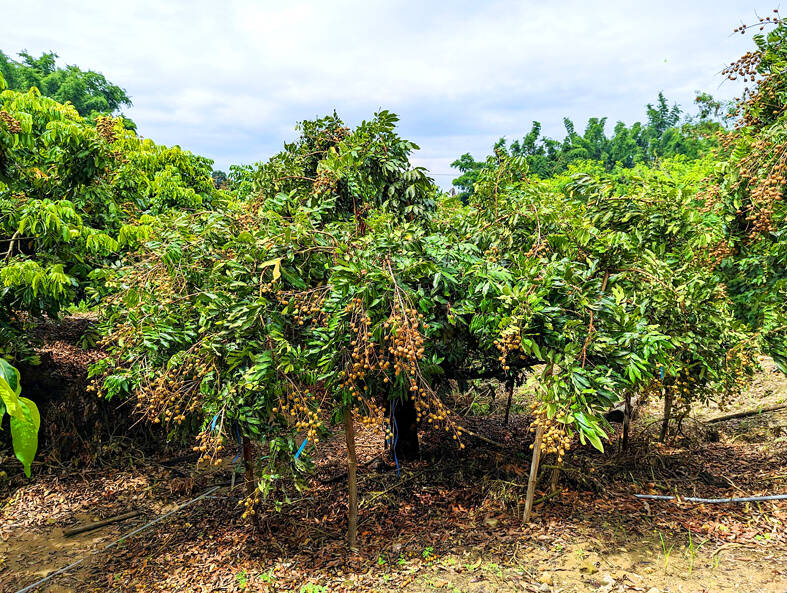The Taiwan Agricultural Research Institute’s Chiayi Agricultural Experiment Branch has developed an advanced flower induction technique using potassium chlorate to boost longan production during warmer winters.
Longan ranks among Taiwan’s top five fruit crops by cultivation area, with 10,437 hectares under cultivation and a total yield of 70,384 tonnes in 2023, the institute said.
Traditionally, longan has been a low-maintenance crop due to its high rate of growth and yield, and resistance to pests and diseases, but in recent years, flowering has declined significantly due to abnormal weather patterns and global warming, resulting in reduced harvests and revenue for farmers, it said.

Photo courtesy of the Taiwan Agricultural Research Institute
Since longan flowers are a major nectar source for bees in spring, poor flowering has also led to a drop in honey yields, it added.
By applying potassium chlorate to induce flowering, the rate of panicle formation during mild winters can be increased by 68 percent to 80 percent, the institute said.
The flower-induction technique was first developed in 1998 by Yan Chang-jui (顏昌瑞), a researcher at the National Pingtung University of Science and Technology’s Department of Plant Industry.
Yan observed that longan trees near temples produced more fruit. He discovered that potassium chlorate — a chemical found in firecrackers — had flower-inducing properties, the institute said.
However, the method was not widely adopted in Taiwan at the time, as potassium chlorate was classified as a controlled substance, limiting its accessibility, the institute said.
Additionally, early applications of the technique yielded limited results, because when the chemical was administered to soils, it could not be effectively absorbed by the deep-going root systems of longan trees, it said.
To improve the reliability of longan flowering during increasingly mild winters, the institute refined Yan’s technique by significantly reducing the amount of potassium chlorate administered to each longan tree and administering the chemical directly to the trees’ leaves rather than the soil, the institute said.
Similar to the effects of cold weather, potassium chlorate activates the flowering mechanism in longan trees, helping to stabilize yields, it said.
Spraying the chemical in early spring — typically in the first half of February — can ensure timely flowering and consistent production, especially following a warm winter, it added.
The method also enables early flowering and harvests the following year, helping farmers avoid the typical market glut during peak season and potentially boosting their income.
Applying potassium chlorate to induce longan flowers not only benefits fruit growers, but also supports the beekeeping industry, as longan blossoms are a major nectar source in spring, it said.
With further application, the technique can play a key role in helping the nation’s agricultural sector adapt to the challenges of climate change, it added.

Alain Robert, known as the "French Spider-Man," praised Alex Honnold as exceptionally well-prepared after the US climber completed a free solo ascent of Taipei 101 yesterday. Robert said Honnold's ascent of the 508m-tall skyscraper in just more than one-and-a-half hours without using safety ropes or equipment was a remarkable achievement. "This is my life," he said in an interview conducted in French, adding that he liked the feeling of being "on the edge of danger." The 63-year-old Frenchman climbed Taipei 101 using ropes in December 2004, taking about four hours to reach the top. On a one-to-10 scale of difficulty, Robert said Taipei 101

Nipah virus infection is to be officially listed as a category 5 notifiable infectious disease in Taiwan in March, while clinical treatment guidelines are being formulated, the Centers for Disease Control (CDC) said yesterday. With Nipah infections being reported in other countries and considering its relatively high fatality rate, the centers on Jan. 16 announced that it would be listed as a notifiable infectious disease to bolster the nation’s systematic early warning system and increase public awareness, the CDC said. Bangladesh reported four fatal cases last year in separate districts, with three linked to raw date palm sap consumption, CDC Epidemic Intelligence

Taiwanese and US defense groups are collaborating to introduce deployable, semi-autonomous manufacturing systems for drones and components in a boost to the nation’s supply chain resilience. Taiwan’s G-Tech Optroelectronics Corp subsidiary GTOC and the US’ Aerkomm Inc on Friday announced an agreement with fellow US-based Firestorm Lab to adopt the latter’s xCell, a technology featuring 3D printers fitted in 6.1m container units. The systems enable aerial platforms and parts to be produced in high volumes from dispersed nodes capable of rapid redeployment, to minimize the risk of enemy strikes and to meet field requirements, they said. Firestorm chief technology officer Ian Muceus said

MORE FALL: An investigation into one of Xi’s key cronies, part of a broader ‘anti-corruption’ drive, indicates that he might have a deep distrust in the military, an expert said China’s latest military purge underscores systemic risks in its shift from collective leadership to sole rule under Chinese President Xi Jinping (習近平), and could disrupt its chain of command and military capabilities, a national security official said yesterday. If decisionmaking within the Chinese Communist Party has become “irrational” under one-man rule, the Taiwan Strait and the regional situation must be approached with extreme caution, given unforeseen risks, they added. The anonymous official made the remarks as China’s Central Military Commission Vice Chairman Zhang Youxia (張又俠) and Joint Staff Department Chief of Staff Liu Zhenli (劉振立) were reportedly being investigated for suspected “serious